HLSC220 Debate: Patient Safety and Protocols in Obesity Surgery
VerifiedAdded on 2022/09/27
|6
|1372
|22
Essay
AI Summary
This essay delves into the ethical considerations surrounding bariatric surgery for individuals suffering from morbid obesity, emphasizing the importance of patient safety and adherence to strict protocols. It argues that while surgery is an effective treatment, it should be approached cautiously, with thorough patient evaluation and consideration of alternative methods first. The essay highlights the need for strict selection criteria, guided by principles of beneficence and non-maleficence, to ensure that the procedure improves the patient's health without causing further harm. It also addresses the potential strain on resources if surgery becomes too easily accessible, advocating for specialized centers that can provide comprehensive care and follow-up. The essay concludes that while obesity surgery offers significant benefits, prioritizing patient safety through rigorous protocols and ethical considerations is paramount, encouraging patients to collaborate closely with medical professionals for optimal outcomes. Desklib provides access to a wealth of solved assignments and study resources for students.
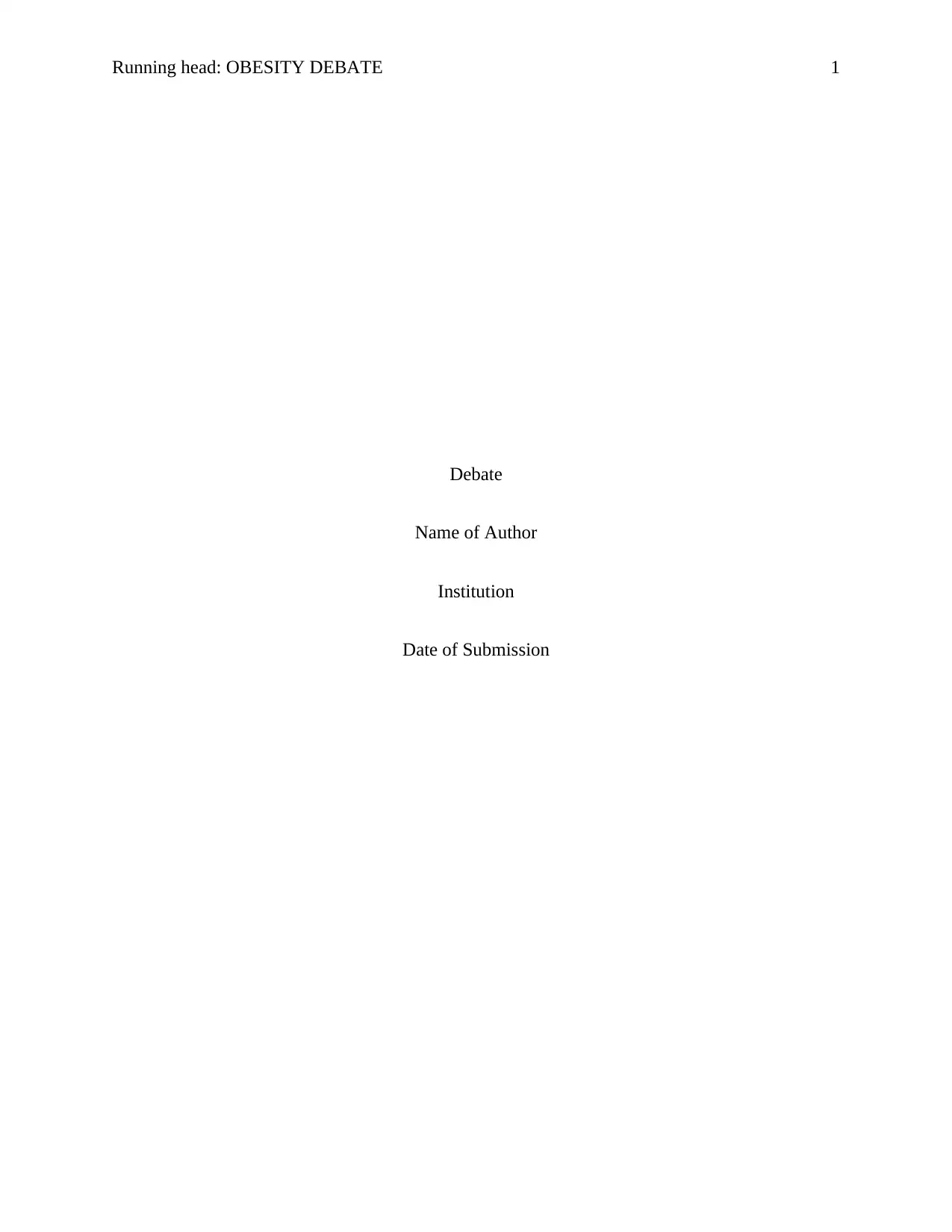
Running head: OBESITY DEBATE 1
Debate
Name of Author
Institution
Date of Submission
Debate
Name of Author
Institution
Date of Submission
Paraphrase This Document
Need a fresh take? Get an instant paraphrase of this document with our AI Paraphraser
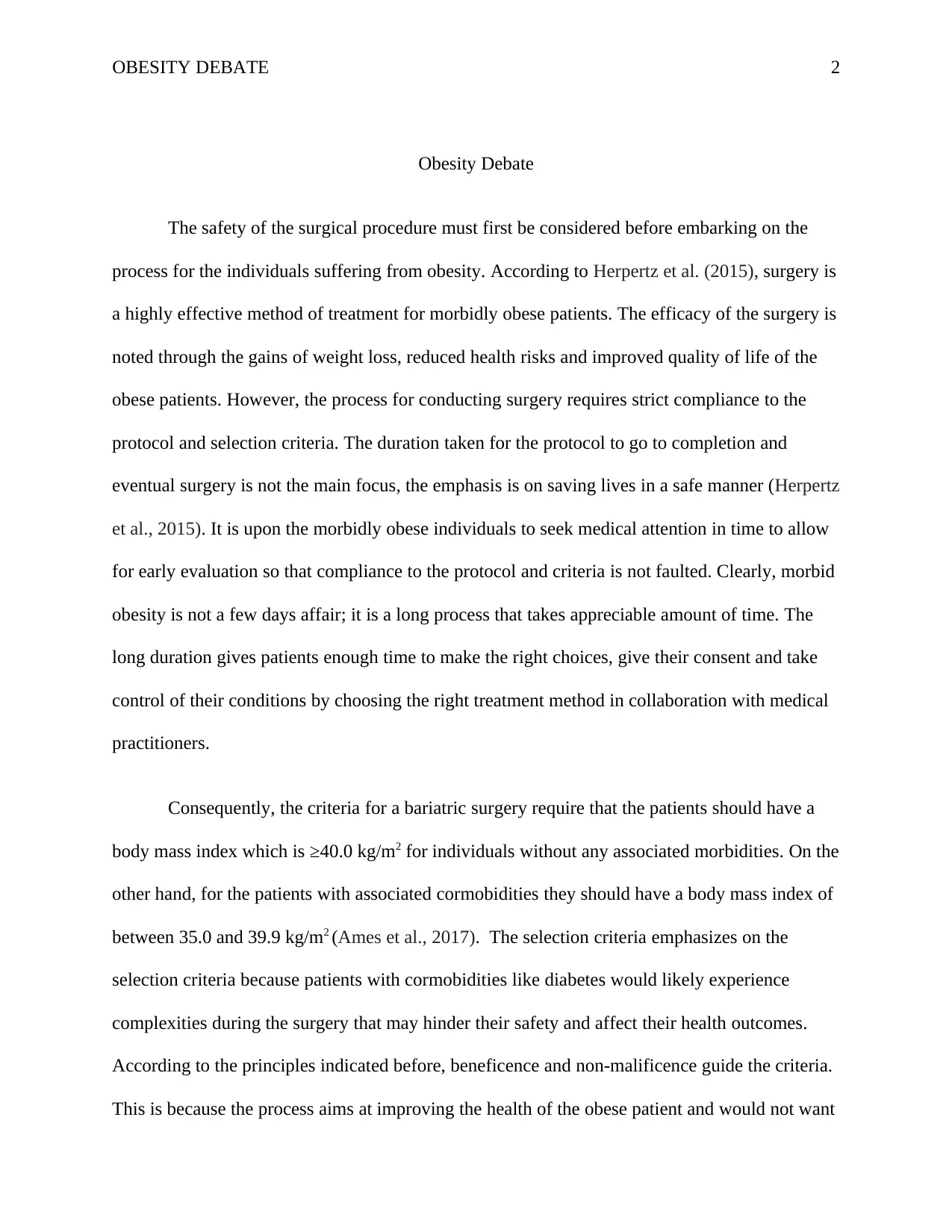
OBESITY DEBATE 2
Obesity Debate
The safety of the surgical procedure must first be considered before embarking on the
process for the individuals suffering from obesity. According to Herpertz et al. (2015), surgery is
a highly effective method of treatment for morbidly obese patients. The efficacy of the surgery is
noted through the gains of weight loss, reduced health risks and improved quality of life of the
obese patients. However, the process for conducting surgery requires strict compliance to the
protocol and selection criteria. The duration taken for the protocol to go to completion and
eventual surgery is not the main focus, the emphasis is on saving lives in a safe manner (Herpertz
et al., 2015). It is upon the morbidly obese individuals to seek medical attention in time to allow
for early evaluation so that compliance to the protocol and criteria is not faulted. Clearly, morbid
obesity is not a few days affair; it is a long process that takes appreciable amount of time. The
long duration gives patients enough time to make the right choices, give their consent and take
control of their conditions by choosing the right treatment method in collaboration with medical
practitioners.
Consequently, the criteria for a bariatric surgery require that the patients should have a
body mass index which is ≥40.0 kg/m2 for individuals without any associated morbidities. On the
other hand, for the patients with associated cormobidities they should have a body mass index of
between 35.0 and 39.9 kg/m2 (Ames et al., 2017). The selection criteria emphasizes on the
selection criteria because patients with cormobidities like diabetes would likely experience
complexities during the surgery that may hinder their safety and affect their health outcomes.
According to the principles indicated before, beneficence and non-malificence guide the criteria.
This is because the process aims at improving the health of the obese patient and would not want
Obesity Debate
The safety of the surgical procedure must first be considered before embarking on the
process for the individuals suffering from obesity. According to Herpertz et al. (2015), surgery is
a highly effective method of treatment for morbidly obese patients. The efficacy of the surgery is
noted through the gains of weight loss, reduced health risks and improved quality of life of the
obese patients. However, the process for conducting surgery requires strict compliance to the
protocol and selection criteria. The duration taken for the protocol to go to completion and
eventual surgery is not the main focus, the emphasis is on saving lives in a safe manner (Herpertz
et al., 2015). It is upon the morbidly obese individuals to seek medical attention in time to allow
for early evaluation so that compliance to the protocol and criteria is not faulted. Clearly, morbid
obesity is not a few days affair; it is a long process that takes appreciable amount of time. The
long duration gives patients enough time to make the right choices, give their consent and take
control of their conditions by choosing the right treatment method in collaboration with medical
practitioners.
Consequently, the criteria for a bariatric surgery require that the patients should have a
body mass index which is ≥40.0 kg/m2 for individuals without any associated morbidities. On the
other hand, for the patients with associated cormobidities they should have a body mass index of
between 35.0 and 39.9 kg/m2 (Ames et al., 2017). The selection criteria emphasizes on the
selection criteria because patients with cormobidities like diabetes would likely experience
complexities during the surgery that may hinder their safety and affect their health outcomes.
According to the principles indicated before, beneficence and non-malificence guide the criteria.
This is because the process aims at improving the health of the obese patient and would not want
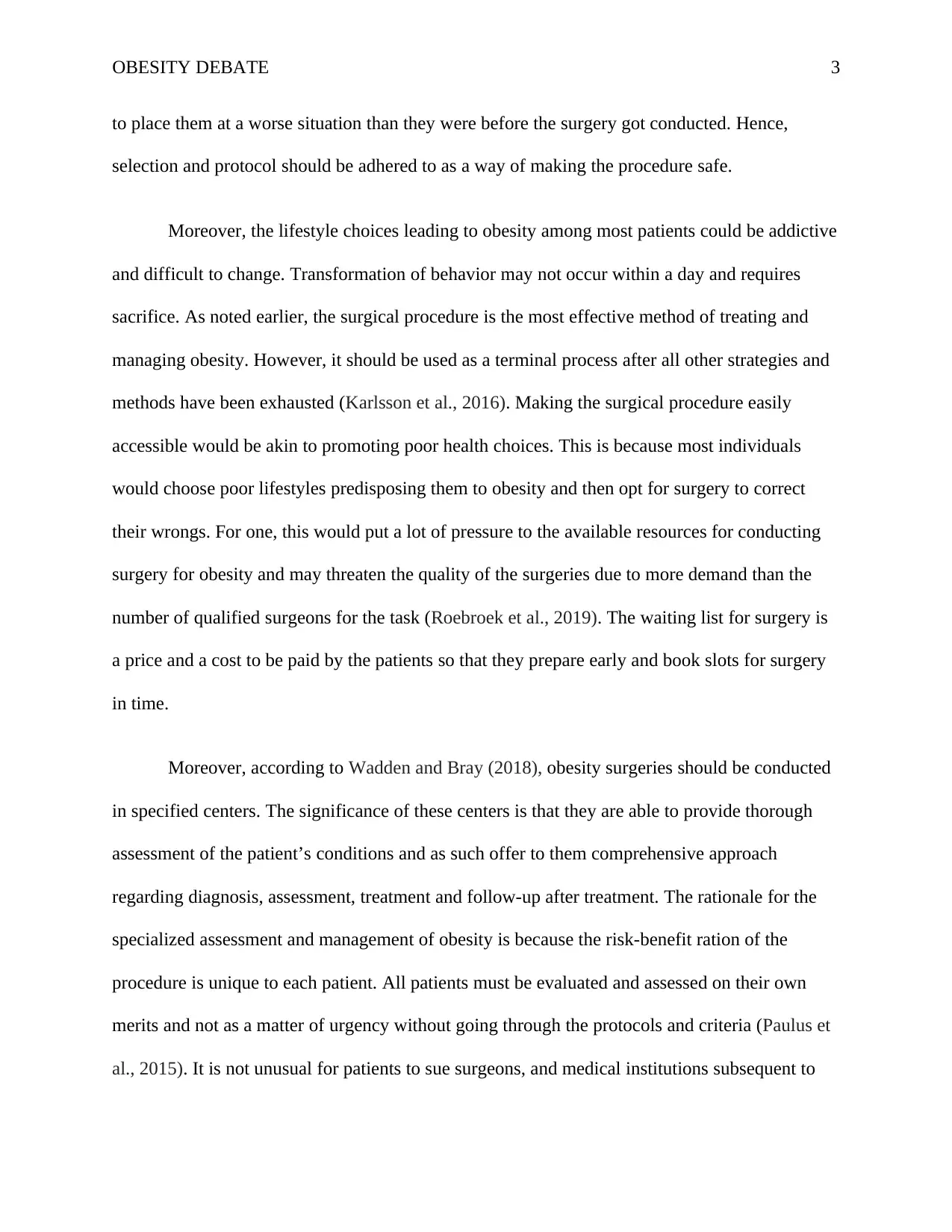
OBESITY DEBATE 3
to place them at a worse situation than they were before the surgery got conducted. Hence,
selection and protocol should be adhered to as a way of making the procedure safe.
Moreover, the lifestyle choices leading to obesity among most patients could be addictive
and difficult to change. Transformation of behavior may not occur within a day and requires
sacrifice. As noted earlier, the surgical procedure is the most effective method of treating and
managing obesity. However, it should be used as a terminal process after all other strategies and
methods have been exhausted (Karlsson et al., 2016). Making the surgical procedure easily
accessible would be akin to promoting poor health choices. This is because most individuals
would choose poor lifestyles predisposing them to obesity and then opt for surgery to correct
their wrongs. For one, this would put a lot of pressure to the available resources for conducting
surgery for obesity and may threaten the quality of the surgeries due to more demand than the
number of qualified surgeons for the task (Roebroek et al., 2019). The waiting list for surgery is
a price and a cost to be paid by the patients so that they prepare early and book slots for surgery
in time.
Moreover, according to Wadden and Bray (2018), obesity surgeries should be conducted
in specified centers. The significance of these centers is that they are able to provide thorough
assessment of the patient’s conditions and as such offer to them comprehensive approach
regarding diagnosis, assessment, treatment and follow-up after treatment. The rationale for the
specialized assessment and management of obesity is because the risk-benefit ration of the
procedure is unique to each patient. All patients must be evaluated and assessed on their own
merits and not as a matter of urgency without going through the protocols and criteria (Paulus et
al., 2015). It is not unusual for patients to sue surgeons, and medical institutions subsequent to
to place them at a worse situation than they were before the surgery got conducted. Hence,
selection and protocol should be adhered to as a way of making the procedure safe.
Moreover, the lifestyle choices leading to obesity among most patients could be addictive
and difficult to change. Transformation of behavior may not occur within a day and requires
sacrifice. As noted earlier, the surgical procedure is the most effective method of treating and
managing obesity. However, it should be used as a terminal process after all other strategies and
methods have been exhausted (Karlsson et al., 2016). Making the surgical procedure easily
accessible would be akin to promoting poor health choices. This is because most individuals
would choose poor lifestyles predisposing them to obesity and then opt for surgery to correct
their wrongs. For one, this would put a lot of pressure to the available resources for conducting
surgery for obesity and may threaten the quality of the surgeries due to more demand than the
number of qualified surgeons for the task (Roebroek et al., 2019). The waiting list for surgery is
a price and a cost to be paid by the patients so that they prepare early and book slots for surgery
in time.
Moreover, according to Wadden and Bray (2018), obesity surgeries should be conducted
in specified centers. The significance of these centers is that they are able to provide thorough
assessment of the patient’s conditions and as such offer to them comprehensive approach
regarding diagnosis, assessment, treatment and follow-up after treatment. The rationale for the
specialized assessment and management of obesity is because the risk-benefit ration of the
procedure is unique to each patient. All patients must be evaluated and assessed on their own
merits and not as a matter of urgency without going through the protocols and criteria (Paulus et
al., 2015). It is not unusual for patients to sue surgeons, and medical institutions subsequent to
⊘ This is a preview!⊘
Do you want full access?
Subscribe today to unlock all pages.

Trusted by 1+ million students worldwide
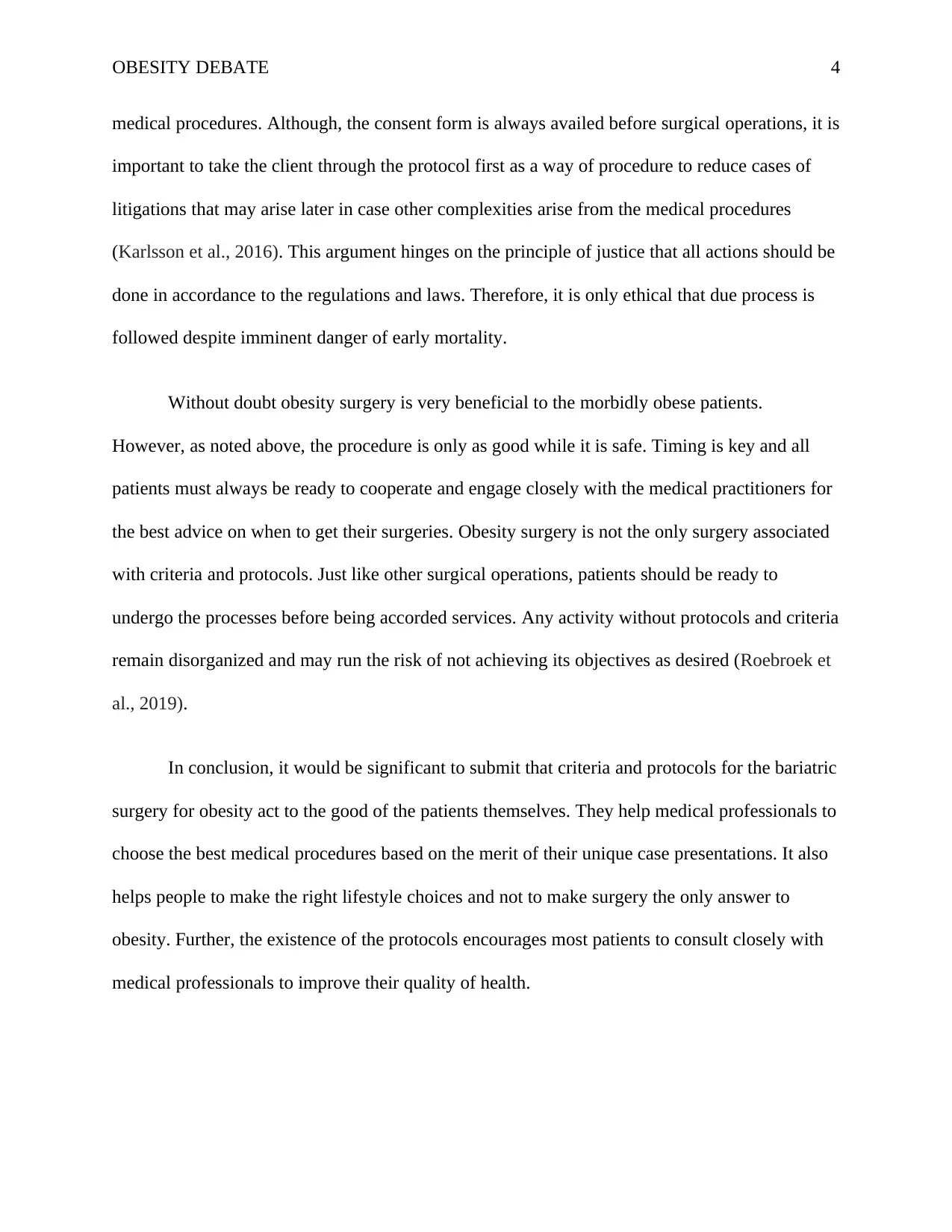
OBESITY DEBATE 4
medical procedures. Although, the consent form is always availed before surgical operations, it is
important to take the client through the protocol first as a way of procedure to reduce cases of
litigations that may arise later in case other complexities arise from the medical procedures
(Karlsson et al., 2016). This argument hinges on the principle of justice that all actions should be
done in accordance to the regulations and laws. Therefore, it is only ethical that due process is
followed despite imminent danger of early mortality.
Without doubt obesity surgery is very beneficial to the morbidly obese patients.
However, as noted above, the procedure is only as good while it is safe. Timing is key and all
patients must always be ready to cooperate and engage closely with the medical practitioners for
the best advice on when to get their surgeries. Obesity surgery is not the only surgery associated
with criteria and protocols. Just like other surgical operations, patients should be ready to
undergo the processes before being accorded services. Any activity without protocols and criteria
remain disorganized and may run the risk of not achieving its objectives as desired (Roebroek et
al., 2019).
In conclusion, it would be significant to submit that criteria and protocols for the bariatric
surgery for obesity act to the good of the patients themselves. They help medical professionals to
choose the best medical procedures based on the merit of their unique case presentations. It also
helps people to make the right lifestyle choices and not to make surgery the only answer to
obesity. Further, the existence of the protocols encourages most patients to consult closely with
medical professionals to improve their quality of health.
medical procedures. Although, the consent form is always availed before surgical operations, it is
important to take the client through the protocol first as a way of procedure to reduce cases of
litigations that may arise later in case other complexities arise from the medical procedures
(Karlsson et al., 2016). This argument hinges on the principle of justice that all actions should be
done in accordance to the regulations and laws. Therefore, it is only ethical that due process is
followed despite imminent danger of early mortality.
Without doubt obesity surgery is very beneficial to the morbidly obese patients.
However, as noted above, the procedure is only as good while it is safe. Timing is key and all
patients must always be ready to cooperate and engage closely with the medical practitioners for
the best advice on when to get their surgeries. Obesity surgery is not the only surgery associated
with criteria and protocols. Just like other surgical operations, patients should be ready to
undergo the processes before being accorded services. Any activity without protocols and criteria
remain disorganized and may run the risk of not achieving its objectives as desired (Roebroek et
al., 2019).
In conclusion, it would be significant to submit that criteria and protocols for the bariatric
surgery for obesity act to the good of the patients themselves. They help medical professionals to
choose the best medical procedures based on the merit of their unique case presentations. It also
helps people to make the right lifestyle choices and not to make surgery the only answer to
obesity. Further, the existence of the protocols encourages most patients to consult closely with
medical professionals to improve their quality of health.
Paraphrase This Document
Need a fresh take? Get an instant paraphrase of this document with our AI Paraphraser
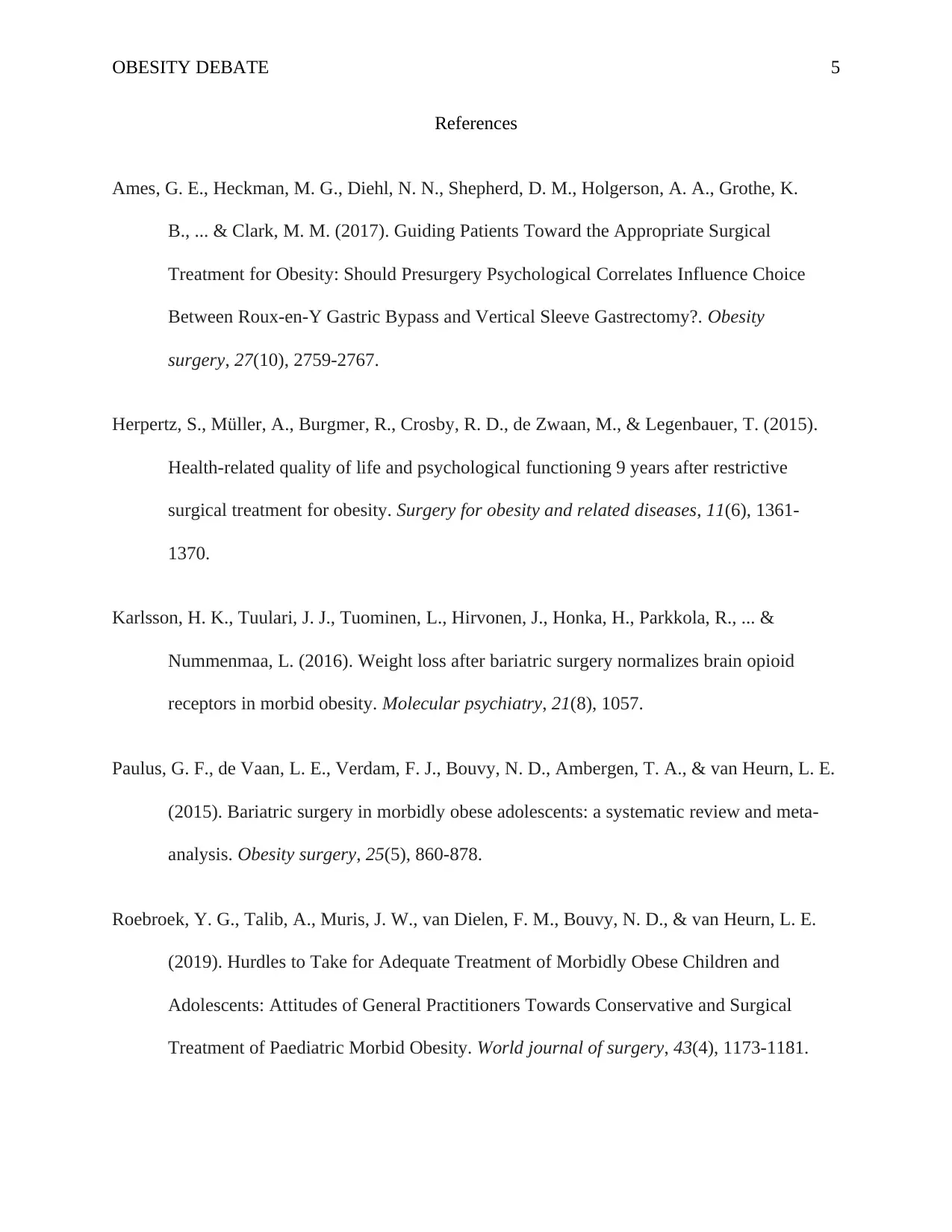
OBESITY DEBATE 5
References
Ames, G. E., Heckman, M. G., Diehl, N. N., Shepherd, D. M., Holgerson, A. A., Grothe, K.
B., ... & Clark, M. M. (2017). Guiding Patients Toward the Appropriate Surgical
Treatment for Obesity: Should Presurgery Psychological Correlates Influence Choice
Between Roux-en-Y Gastric Bypass and Vertical Sleeve Gastrectomy?. Obesity
surgery, 27(10), 2759-2767.
Herpertz, S., Müller, A., Burgmer, R., Crosby, R. D., de Zwaan, M., & Legenbauer, T. (2015).
Health-related quality of life and psychological functioning 9 years after restrictive
surgical treatment for obesity. Surgery for obesity and related diseases, 11(6), 1361-
1370.
Karlsson, H. K., Tuulari, J. J., Tuominen, L., Hirvonen, J., Honka, H., Parkkola, R., ... &
Nummenmaa, L. (2016). Weight loss after bariatric surgery normalizes brain opioid
receptors in morbid obesity. Molecular psychiatry, 21(8), 1057.
Paulus, G. F., de Vaan, L. E., Verdam, F. J., Bouvy, N. D., Ambergen, T. A., & van Heurn, L. E.
(2015). Bariatric surgery in morbidly obese adolescents: a systematic review and meta-
analysis. Obesity surgery, 25(5), 860-878.
Roebroek, Y. G., Talib, A., Muris, J. W., van Dielen, F. M., Bouvy, N. D., & van Heurn, L. E.
(2019). Hurdles to Take for Adequate Treatment of Morbidly Obese Children and
Adolescents: Attitudes of General Practitioners Towards Conservative and Surgical
Treatment of Paediatric Morbid Obesity. World journal of surgery, 43(4), 1173-1181.
References
Ames, G. E., Heckman, M. G., Diehl, N. N., Shepherd, D. M., Holgerson, A. A., Grothe, K.
B., ... & Clark, M. M. (2017). Guiding Patients Toward the Appropriate Surgical
Treatment for Obesity: Should Presurgery Psychological Correlates Influence Choice
Between Roux-en-Y Gastric Bypass and Vertical Sleeve Gastrectomy?. Obesity
surgery, 27(10), 2759-2767.
Herpertz, S., Müller, A., Burgmer, R., Crosby, R. D., de Zwaan, M., & Legenbauer, T. (2015).
Health-related quality of life and psychological functioning 9 years after restrictive
surgical treatment for obesity. Surgery for obesity and related diseases, 11(6), 1361-
1370.
Karlsson, H. K., Tuulari, J. J., Tuominen, L., Hirvonen, J., Honka, H., Parkkola, R., ... &
Nummenmaa, L. (2016). Weight loss after bariatric surgery normalizes brain opioid
receptors in morbid obesity. Molecular psychiatry, 21(8), 1057.
Paulus, G. F., de Vaan, L. E., Verdam, F. J., Bouvy, N. D., Ambergen, T. A., & van Heurn, L. E.
(2015). Bariatric surgery in morbidly obese adolescents: a systematic review and meta-
analysis. Obesity surgery, 25(5), 860-878.
Roebroek, Y. G., Talib, A., Muris, J. W., van Dielen, F. M., Bouvy, N. D., & van Heurn, L. E.
(2019). Hurdles to Take for Adequate Treatment of Morbidly Obese Children and
Adolescents: Attitudes of General Practitioners Towards Conservative and Surgical
Treatment of Paediatric Morbid Obesity. World journal of surgery, 43(4), 1173-1181.

OBESITY DEBATE 6
Wadden, T. A., & Bray, G. A. (Eds.). (2018). Handbook of obesity treatment. Guilford
Publications.
Wadden, T. A., & Bray, G. A. (Eds.). (2018). Handbook of obesity treatment. Guilford
Publications.
⊘ This is a preview!⊘
Do you want full access?
Subscribe today to unlock all pages.

Trusted by 1+ million students worldwide
1 out of 6
Related Documents
Your All-in-One AI-Powered Toolkit for Academic Success.
+13062052269
info@desklib.com
Available 24*7 on WhatsApp / Email
![[object Object]](/_next/static/media/star-bottom.7253800d.svg)
Unlock your academic potential
Copyright © 2020–2026 A2Z Services. All Rights Reserved. Developed and managed by ZUCOL.




